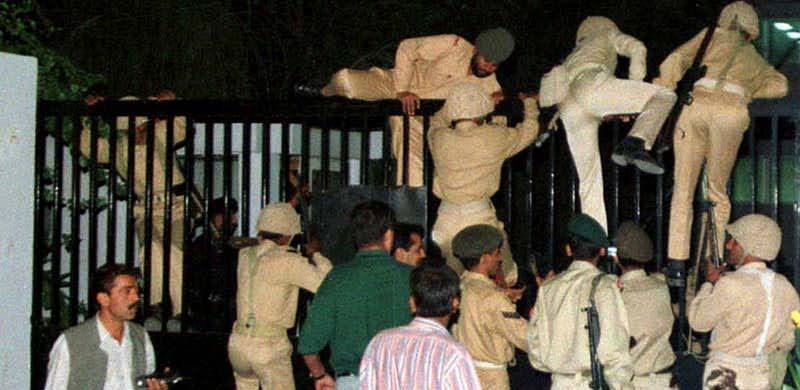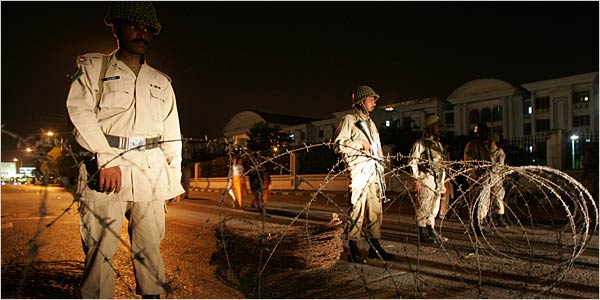
Ahmad Faruqui in this article tries to determine the odds of a "hard" coup in case the current government led by Pakistan Tehreek-e-Insaf fails to improve the economy and the overall political stability of the country.
The glorious aerial encounter in the skies above Kashmir between the PAF and the IAF in which an Indian MiG-21 was downed is a distant memory, eclipsed by the sudden dismissal of the finance minister.
For the past eight months, the prime minister had been painting a rosy picture of the economy. So this took the bloom off the rose.
Imran Khan had promised to create a “New” Pakistan which would be an Islamic Welfare state. This would merge the 7th century style of governance in Medina with that of 21st century Sweden and China. $200 billion of looted wealth would return home on the first day of his tenure. A multi-billion dollar dam would be built with crowdsourcing. No one would go to the Gulf Arabs with a begging bowl. Nor would anyone go begging to the IMF for money to stave off a default.
When others thought this grandiose vision bordered on fantasy, a Midsummer Night’s Dream as it were, they were admonished. They were told it would take time to fix the mess.
Yet when the Financial Action Task Force said the same things, the message registered.
Seeking to remind people of his past glories, Imran Khan resorted to a cricketing metaphor. The dismissal was “a reshuffling of the batting order.” The wicket had turned sticky.
Umar was the ace in the batting lineup, an old trusted friend, a “genius” with extensive private sector experience, an entrepreneur par excellence who was going to bring such large-scale prosperity to the country that there would be no one left to whom Zakat could be given.
You don’t remove your star batsman from the batting order just like that. Something smells fishy.
The most likely explanation is that the Establishment got restless with the country’s progress under Imran. They have appointed him through a soft coup. Now the honeymoon is over. When they pressured him, he had to do something. The finance minister became the scapegoat.
Dr Abdul Hafeez Shaikh is the new finance minister. He knows the economy well. It has chronically low savings and tax rates. Exports are price inelastic. Inflation is rampant. Economic growth has plummeted. And the country has yawning fiscal and trade deficits. It won’t be easy to fix such structural problems.
The patience of the generals is running out. If these issues are not resolved in the next few months, they may resort to a “hard” coup. In Pakistan’s 72 year history, Pakistan has experienced at least 9 hard coups, of which 6 have succeeded. The coups have yielded 33 years of direct military rule and a quarter century of indirect military rule. The key point is that longest period of time between coups has been 11 years.
The Nawaz Sharif government was overthrown last year in a soft coup 10 years after the Musharraf dictatorship had ended. In Nawaz’s place, the army installed Imran Khan who had been struggling in vain to find his political identity for 28 years.
When has the army mounted a coup?
In general, five factors have contributed to a coup in the past.
When the military installed ZA Bhutto, it hoped that he would stay beholden to them. Sensing a threat, Bhutto removed the very two flag officers who had installed him within three months, accusing them of Bonapartist tendencies. There was no counter coup because public opinion was totally against the military at the time. At this point the sentiment is very pro-military.
Once a decision is made to execute a coup, it is executed with alacrity by the 111 Brigade. The army chief, whoever he might be, then proceeds to “take the nation into confidence” via a televised broadcast. The general in full battlefield regalia appears on TV saying he has taken the decision to suspend the constitution with great reluctance: “To save the body, I had to amputate the arm.”
The general will say his goal is to create a strong and united country free from corruption and internal strife. And then he will make sure that the Supreme Court confers on him the fig leaf of legitimacy.

On the global stage, coups are frowned upon. That’s why in this day and age the army prefers to rule from behind the scenes and play the role of puppet master.
If Imran does not improve his game, he will be replaced with another civilian. But it has been several years since a coup took place. Memories are short and people have forgotten the issues that arose during the Musharraf dictatorship.
Thus, in the next year or two, a coup cannot be ruled out. It will all depend on the emotional temper of the army chief at the time. Militarism, at least in the beginning, comes across as a joy ride. Within days of seizing power, Musharraf famously told a British reporter, “It’s a good feeling to be in charge.”
The glorious aerial encounter in the skies above Kashmir between the PAF and the IAF in which an Indian MiG-21 was downed is a distant memory, eclipsed by the sudden dismissal of the finance minister.
For the past eight months, the prime minister had been painting a rosy picture of the economy. So this took the bloom off the rose.
Also read: Field Marshal Ayub’s Myth Of Indispensability
Imran Khan had promised to create a “New” Pakistan which would be an Islamic Welfare state. This would merge the 7th century style of governance in Medina with that of 21st century Sweden and China. $200 billion of looted wealth would return home on the first day of his tenure. A multi-billion dollar dam would be built with crowdsourcing. No one would go to the Gulf Arabs with a begging bowl. Nor would anyone go begging to the IMF for money to stave off a default.
When others thought this grandiose vision bordered on fantasy, a Midsummer Night’s Dream as it were, they were admonished. They were told it would take time to fix the mess.
Yet when the Financial Action Task Force said the same things, the message registered.
Seeking to remind people of his past glories, Imran Khan resorted to a cricketing metaphor. The dismissal was “a reshuffling of the batting order.” The wicket had turned sticky.
Umar was the ace in the batting lineup, an old trusted friend, a “genius” with extensive private sector experience, an entrepreneur par excellence who was going to bring such large-scale prosperity to the country that there would be no one left to whom Zakat could be given.
You don’t remove your star batsman from the batting order just like that. Something smells fishy.
Also read: Myth Of Indispensability – Part II: Zia, And The Holy Trinity
The most likely explanation is that the Establishment got restless with the country’s progress under Imran. They have appointed him through a soft coup. Now the honeymoon is over. When they pressured him, he had to do something. The finance minister became the scapegoat.
Dr Abdul Hafeez Shaikh is the new finance minister. He knows the economy well. It has chronically low savings and tax rates. Exports are price inelastic. Inflation is rampant. Economic growth has plummeted. And the country has yawning fiscal and trade deficits. It won’t be easy to fix such structural problems.
The patience of the generals is running out. If these issues are not resolved in the next few months, they may resort to a “hard” coup. In Pakistan’s 72 year history, Pakistan has experienced at least 9 hard coups, of which 6 have succeeded. The coups have yielded 33 years of direct military rule and a quarter century of indirect military rule. The key point is that longest period of time between coups has been 11 years.
Also read: Myth Of Indispensability – Part III: Musharraf, And The Shakespearean Tragedy
The Nawaz Sharif government was overthrown last year in a soft coup 10 years after the Musharraf dictatorship had ended. In Nawaz’s place, the army installed Imran Khan who had been struggling in vain to find his political identity for 28 years.
When has the army mounted a coup?
In general, five factors have contributed to a coup in the past.
- The most significant is the inability of the civilian government to stem an ongoing economic crisis. Gen Ayub, the C-in-C of the army, seized power in 1958 largely because of the slow economic progress of the 1950s.
- Second is political instability. The combination of the first two factors allowed Gen Yahya, C-in-C, to depose President Ayub in 1969. He did not care that Field Marshal Ayub had hand-picked him for the C-in-C position in 1966. Loyalty goes out the window very fast. The closing years of Gen Zia’s reign were marked by burgeoning political instability. That factor, coupled with a desire to put an end to his long tenure, precipitated the coup which killed him.
- Third is a major defeat in a war. Pakistan’s defeat against India in December 1971 was used by Lt-Gen Gul Hasan, the army chief, and Air Marshal Rahim, the air force chief, to depose Gen Yahya and install the populist ZA Bhutto in office.
- Fourth is a perception among the top brass that the civilian government is threatening its corporate interests. Imran Khan knows the boundaries well. In the case of Pakistan, that means the army’s total dominance over the country’s defense and foreign policies, and especially its relationship with India, comes under threat. This factor has been used thrice to dismiss Prime Minister Nawaz Sharif.
- Fifth is bad chemistry between the army chief and the civilian government. When ZA Bhutto began to rub General Zia’s nose into the mud in 1977, a coup became unavoidable.
When the military installed ZA Bhutto, it hoped that he would stay beholden to them. Sensing a threat, Bhutto removed the very two flag officers who had installed him within three months, accusing them of Bonapartist tendencies. There was no counter coup because public opinion was totally against the military at the time. At this point the sentiment is very pro-military.
Once a decision is made to execute a coup, it is executed with alacrity by the 111 Brigade. The army chief, whoever he might be, then proceeds to “take the nation into confidence” via a televised broadcast. The general in full battlefield regalia appears on TV saying he has taken the decision to suspend the constitution with great reluctance: “To save the body, I had to amputate the arm.”
The general will say his goal is to create a strong and united country free from corruption and internal strife. And then he will make sure that the Supreme Court confers on him the fig leaf of legitimacy.

On the global stage, coups are frowned upon. That’s why in this day and age the army prefers to rule from behind the scenes and play the role of puppet master.
If Imran does not improve his game, he will be replaced with another civilian. But it has been several years since a coup took place. Memories are short and people have forgotten the issues that arose during the Musharraf dictatorship.
Thus, in the next year or two, a coup cannot be ruled out. It will all depend on the emotional temper of the army chief at the time. Militarism, at least in the beginning, comes across as a joy ride. Within days of seizing power, Musharraf famously told a British reporter, “It’s a good feeling to be in charge.”
